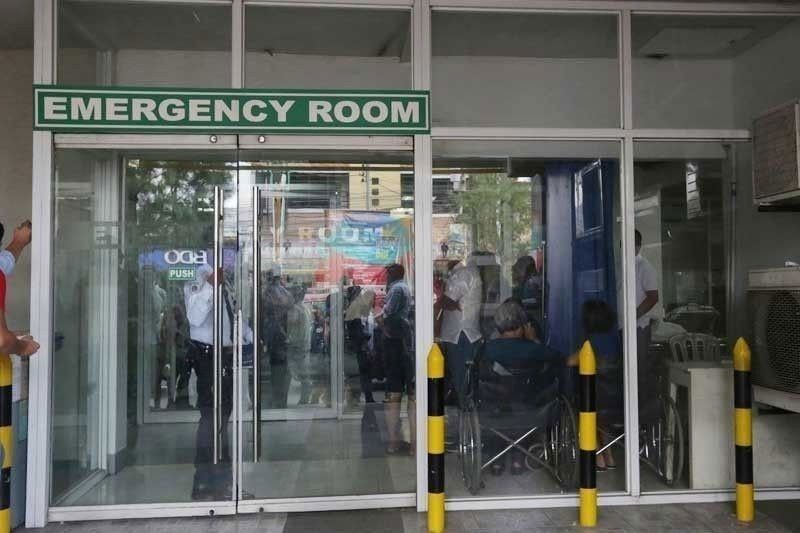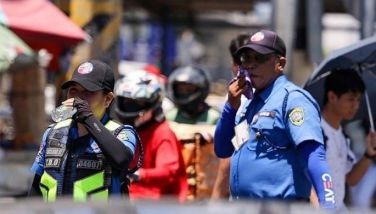Private hospitals ready for surge in COVID-19 cases

MANILA, Philippines — The Private Hospitals Association of the Philippines Inc. (PHAPI)’s members are ready to admit COVID-19 patients whose numbers are expected to increase later this month.
PHAPI president Dr. Jose Rene de Grano yesterday said they are prepared to admit COVID-19 cases in case the numbers continue to surge, particularly severe and critical cases.
“Our hospitals are always prepared as our COVID areas weren’t closed down. They are always ready in case there are those that need admission due to
COVID,” De Grano said in the Laging Handa public briefing.
He said they can have other health care workers in non-high risk areas attend to COVID-19 patients. Still, he added: “Our only limitation is really the possible shortage in health care workers.”
Latest data showed that seven provinces have at least a 10 percent positivity rate for COVID-19, OCTA Research said yesterday.
It said that data as of Tuesday showed that the indicator, which measures the number of positive results out of the total tests conducted, continued to increase in different parts of the country.
In the National Capital Region (NCR), positivity rate increased from 8.3 percent on July 2 to 9.8 percent on Tuesday, still considered by OCTA as “moderate.”
However, seven provinces have already logged “high” positivity rates or at least 10 percent.
These are Antique with 20.6 percent (from 17.1 percent), Laguna with 17.3 percent (from 10.3 percent), Rizal with 16.5 percent (from 11.3 percent), Pampanga with 17.3 percent (from 10.3 percent), Cavite with 13.2 percent (from 11.7 percent), Batangas with 10.7 percent (from 7.3 percent) and Iloilo with 10.1 percent (from 7.2 percent).
In addition to NCR, also recording moderate positivity rates were Isabela with 8.3 percent (from 3.4 percent), Pangasinan with eight percent (from five percent), Benguet with 6.7 percent (from 6.2 percent), Bataan with 6.2 percent (from five percent), Davao del Sur with 5.8 percent (from 3.2 percent) and Bulacan with 5.6 percent (from 4.3 percent).
The World Health Organization recommends a positivity rate threshold of five percent.
While positivity rates have increased in recent days, the number of new cases in many of these provinces remains low. Antique, for instance, recorded only 12 new cases on Wednesday.
Out of the 1,198 new cases reported on Wednesday, OCTA said 553 were in the NCR, followed by Cavite with 104, Laguna with 70, Iloilo with 64 and Batangas with 53.
OCTA’s Guido David earlier said that ongoing weak surge may peak in the first half of July.
Traffic light approach
Meanwhile, a simplified traffic light approach to the pandemic alert level system to be decided by local governments is being pushed by a consultative group led by Go Negosyo founder Joey Concepcion.
In a statement yesterday, Concepcion shared that among the suggestions of his consultative group composed of private sector representatives, medical, data and economic experts, is making the alert level system as simple as the red-yellow-green traffic light to mean high, medium or low pandemic risk levels.
“This system is already familiar to the public,” Concepcion said, noting that it is already in use for disaster risk management.
The group recommended the use of two metrics for the alert level system – health care utilization rates, referring to the number of COVID-19 cases requiring hospitalization; and the average daily attack rate, which is the number of infections per thousand people.
It added that the red-yellow-green alert levels will be determined per region, and will trigger specific restrictions for activity, including the wearing of face masks, but also on the regional level.
“We don’t want to penalize the LGUs that have been doing a good job at vaccinating their population,” Concepcion said, adding that local government units should play a bigger role in pandemic management moving forward.
“The state of public health emergency expires in September. Whether this will be extended or modified or suspended will determine our course of action. We need to plan now,” he added.
The consultative process of the group was participated in by the Philippine Chamber of Commerce and Industry, Philippine Franchise Association, Philippine Retailers Association, Federation of Indian Chambers of Commerce, Resto.PH, Federation of Filipino Chinese Chambers of Commerce and Industry, People Management Association of the Philippines, Association of Filipino Franchisers Inc., Semiconductors and Electronics Industries in the Philippines Foundation Inc., Asia Council of Small Business and the European Chamber of Commerce of the Philippines.
In addition, the newly formed Advisory Council of Experts (ACE) also provided technical and medical advice.
Among its members are National Task Force against COVID-19 special adviser Teddy Herbosa, COVID-19 Technical Working Group chairperson Nina Gloriani, Vaccine Expert Panel member Rontgene Solante, Philippine College of Physicians president Maricar Limpin, health reform advocate Tony Leachon, infectious diseases expert Benjamin Co, OCTA Research fellows Ranjit Rye, Nic Austriaco and David, economist Romy Bernardo, and Go Negosyo senior adviser Josephine Romero.
The group convened by Concepcion came together in the first of several consultations for the country’s next steps in the pandemic.
He said details of the recommendations, once the consultations with the different industry chambers and the private sector are completed, will be shared with President Marcos.
‘COVID-19 reinfection is worse’
Last Wednesday night, Solante warned the public against suffering from a more severe bout with COVID-19 once reinfection occurs.
“There is data now telling us that when you have a reinfection, your risk of more severe COVID will also be high, your risk of long COVID especially affecting the heart and the lungs, will also be higher,” he told “The Chiefs” on Cignal TV’s One News channel.
“If you have the first infection, you are protected. But if you are not protected, and then you get the second infection because you have breakthrough infection, there will be some more complications on your part. During the first infection you have that antibody but that antibody doesn’t work anymore in the second infection, because this is now a new variant,” explained Solante.
He said that the important message, based on this observation, is for people to get vaccinated to prevent getting reinfected and prevent long-term complications of COVID-19 as well.
Once done with the primary vaccine series, the priority now is to receive the first booster shot, he added.
“We need to get this done especially for the general population. Now, let’s see, if no other variant of concern surfaces, I think we are okay with the first booster. But what if another variant comes in?” Solante said.
Vaccination still not mandatory
The Department of Health (DOH) said there is no order yet stating that vaccination and getting booster doses is mandatory.
In an online briefing, Health Undersecretary Maria Rosario Vergeire stressed that the agency did not issue a statement that boosters will become mandatory.
“It is not in our direction, it is not in our pronouncements. What we are saying is that there is a need to intensify the uptake of booster doses in the country because we are seeing, and our experts are saying that the immunity for our population is already waning so there is a need to really increase the numbers in terms of vaccination and booster uptake,” Vergeire explained.
She said “the DOH is now working closely with the rest of the government agencies to make this happen and to concretize the strategies, instructions and guidance that the President imparted to us.”
The DOH officials including Vergeire earlier met with President Marcos. “We have met with the President, we have presented to the President our COVID-19 situation and our COVID-19 vaccination program wherein the President gave instructions as to how we can implement and improve our pandemic response, and at the same time, improve the vaccination coverage in the country,” Vergeire pointed out.
She added that the issue concerning the appointment of a new health secretary was not discussed in the meeting. – Catherine Talavera, Janvic Mateo, Rhodina Villanueva
- Latest
- Trending
































